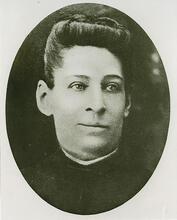Frances Wisebart Jacobs
Volunteer, social worker, and founder of Hebrew Ladies’ Relief Society and the Denver Ladies’ Relief Society, Frances Wisebart Jacobs (1843–1892).
Image courtesy of Beck Archives, Special Collections, Penrose Library and CJS, University of Denver. This image is in the public domain.
Francis Wisebard Jacobs helped transform the fledgling state of Colorado through her organization of charities and hospitals. In 1870, Jacobs settled in what would later become Denver, organizing the Hebrew Ladies’ Relief Society and the Denver Ladies’ Relief Society, a free kindergarten, and the Charity Organization Society, which collected money from local businesses to support community projects. A compelling speaker, she addressed national conventions and acted as spokesperson for the organizations she created, becoming known as Denver’s “mother of charities.” Jacobs also worked with the hundreds of tuberculosis patients who came to Colorado hoping the dry air and sunshine might provide a cure. While she began by simply offering basic necessities and checking in on the sick, Jacobs quickly moved to establish a hospital for them. Through her efforts, the Jewish Hospital Association bought land and began constructing a sanatorium in 1892, laying the cornerstone one month before her death. The hospital was named in her honor upon its completion.
There are sixteen stained-glass windows in the dome of Colorado’s state capitol, each one illustrating a pioneer who was an important influence on Colorado’s development. Among them is one woman, Frances Wisebart Jacobs.
Early Life and Family
Frances Wisebart Jacobs was born in Harrodsburg, Kentucky, on March 29, 1843, the first daughter and second child of Leon and Rosetta Wisebart, who had emigrated from Bavaria. During Jacobs’s early childhood, the family moved to Cincinnati, Ohio, where Leon Wisebart worked as a tailor. Frances, with her six siblings, attended public schools. There she met Abraham Jacobs, a friend of her brother Benjamin.
Abraham Jacobs and Benjamin Wisebart traveled to the West in 1859 and settled in the area that would soon become the frontier town of Denver. Both men were active in the political and Jewish life of the community. Abraham Jacobs started a general store and operated a stagecoach that rode to Santa Fe, New Mexico. In 1863, he returned to Cincinnati, where he and Frances Wisebart were married on February 18. The couple had three children: Benjamin, who became a lawyer; Evelyn, later a schoolteacher; and another child who died young.
The Jacobses’ first home was in Central City, Colorado, a thriving mining town about thirty miles west of Denver. In 1870, they moved to Denver, and Frances Jacobs’s contributions as a volunteer social worker were first recorded.
Work and Organizing
In 1872, Jacobs organized and became president of the Hebrew Ladies’ Relief Society. However, she soon realized that the problems of poverty, sickness, malnutrition, and unsanitary living conditions were not limited to the Jewish community. Accordingly, she broadened the scope of her work, and through her leadership, the Denver Ladies’ Relief Society was established in 1874. Jacobs was vice president and acted as the group’s public speaker.
In 1880, Jacobs was instrumental in setting up Denver’s first free kindergarten for children of poor parents. In 1887, Reverend Myron Reed of Denver’s First Congregational Church, Monsignor William O’Ryan of the Catholic archdiocese, and Frances Jacobs formed the Charity Organization Society, the forerunner of the community chest. Jacobs became known as Denver’s “mother of charities.” She was a magnetic and compelling speaker and addressed many national conferences of the Association of Charities and Corrections.
Because Colorado’s dry air and sunshine were considered to be a cure for tuberculosis, hundreds of sufferers, among them many Jews, came to Denver. As part of her work, Jacobs regularly visited impoverished homes to bring food, coal, clothing, and soap. She was not afraid to touch an emaciated body, and she did not flinch at the sight of blood. She often stopped to give aid to someone who had fallen on the street from a hemorrhage. A woman of great compassion, Jacobs began intense work to establish a sanatorium.
On April 8, 1890, articles of incorporation of the Jewish Hospital Association of Colorado were filed. The association bought land east of the city, and on October 9, 1892, the cornerstone of the hospital was laid. Less than one month later, on November 3, Frances Wisebart Jacobs died in her Denver home. The sanatorium for which she had worked so diligently was named after her: the Frances Jacobs Hospital. In 1900, under the sponsorship of B’nai B’rith, it became the National Jewish Hospital.
Anfenger, Milton L. Birth of a Hospital (1942).
Breck, Allen D. Centennial History of the Jews of Colorado 1859–1959 (1960).
Hornbein, Marjorie. “Frances Jacobs: Denver’s Mother of Charities.” Western States Jewish Historical Quarterly (January 1983).
NAW; Smiley, Jerome, ed. History of Denver (1901).
Smith, Joseph Emerson. “Jewish Pioneers of Colorado.” Denver Jewish News, September 15, 1939.
Uchill, Ida. Pioneers, Peddlers and Tsadikim: The Story of Jewish Colorado (1957).




